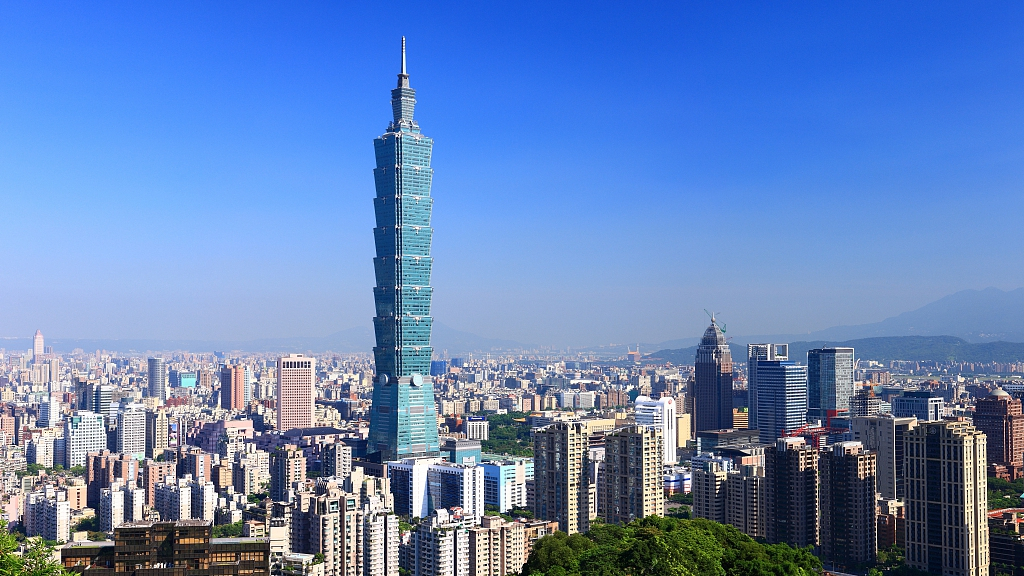
The Taipei 101 skyscraper commands the urban landscape in Taipei, Taiwan. [Photo/Xinhua]
Lai Ching-te blatantly peddled "Taiwan independence" in his speech after assuming the role of the Taiwan region's new leader on Monday, and while the address was full of "pro-independence" sentiment, it lacked a legal basis, experts said.
Bao Chengke, assistant director at the Institute for East Asian Studies in Shanghai, said the speech by Lai was a presentation of the "Taiwan independence" ideology cloaked in the rhetoric of a so-called "two-state" theory.
In his speech, Lai was following the "pro-independence" path taken by his predecessor, Tsai Ing-wen, by attempting to sever Taiwan's history from that of the Chinese nation, and blatantly claiming that Taiwan is a "sovereign, independent nation", which lacks a legal basis, he said.
Fred Tzou Jyh-chyang, deputy secretary-general of the United States-based Alliance for China's Peaceful Reunification, said that historically, Taiwan has always been a part of China's territory, with cultural, linguistic and religious roots originating from the mainland.
The majority of Taiwan's population are descendants of immigrants from the mainland, including Lai, whose ancestors migrated from Zhangzhou, Fujian province, during the Qing Dynasty (1644-1911), said Tzou, who comes from Taiwan.
"Compatriots on both sides of the Taiwan Strait are all Chinese, inseparable in terms of land and bloodline. If Lai does not acknowledge that he is Chinese, wouldn't that be tantamount to forgetting his ancestors and heritage?" he said.
Internationally, almost all countries have diplomatic relations with Beijing and recognize the one-China principle. Since Taiwan is a part of Chinese territory, its destiny should be naturally determined by the people of both the mainland and Taiwan, he said.
After eight years of the Democratic Progressive Party in power, more people in Taiwan are willing to support the resumption of cross-Strait dialogue and the improvement of cross-Strait relations, and the DPP's approach has damaged cross-Strait relations, which is not what most Taiwan residents want, he added.
"If the DPP does not recognize the 1992 Consensus, which embodies the one-China principle, and is unwilling to abandon 'Taiwan independence', how can the two sides engage in dialogue and communication without a foundational platform for dialogue?"
Additionally, during the DPP's administration, it has aggressively revised textbooks to promote de-Sinicization and anti-China sentiment, brainwashing Taiwan students and carrying out anti-Chinese cultural education, he said.
Bao said that the mainland should closely monitor how Lai advances further "ties" with foreign forces to challenge China's core interests, how he potentially intensifies efforts to culturally distance Taiwan from the mainland, and how he seeks economic decoupling from mainland industries.
It's predicted that Lai's cross-Strait policy will continue to emphasize confrontation and the hindrance of exchanges between the two sides is due to Lai's "pro-independence" stance, he said.
Foreign Ministry spokesman Wang Wenbin on Tuesday condemned some countries that have diplomatic relations with China for sending officials to attend Lai's "inauguration ceremony".
Recently, numerous political figures and individuals from various sectors in many countries have reaffirmed their commitment to the one-China principle and firmly supported China's pursuit of national reunification and its stance against "Taiwan independence" separatism, he said.
This once again demonstrates that the international community's fundamental trend of upholding the one-China principle is unshakable, he added.
-
Xi stresses efforts to deepen reforms
Xi stresses efforts to deepen reforms
-
Xi welcomes US visitors to see real China
Xi welcomes US visitors to see real China
-
'Taiwan independence' ideology condemned
'Taiwan independence' ideology condemned
-
Mainland: 'Taiwan independence' incompatible with cross-Strait peace
Mainland: 'Taiwan independence' incompatible with cross-Strait peace